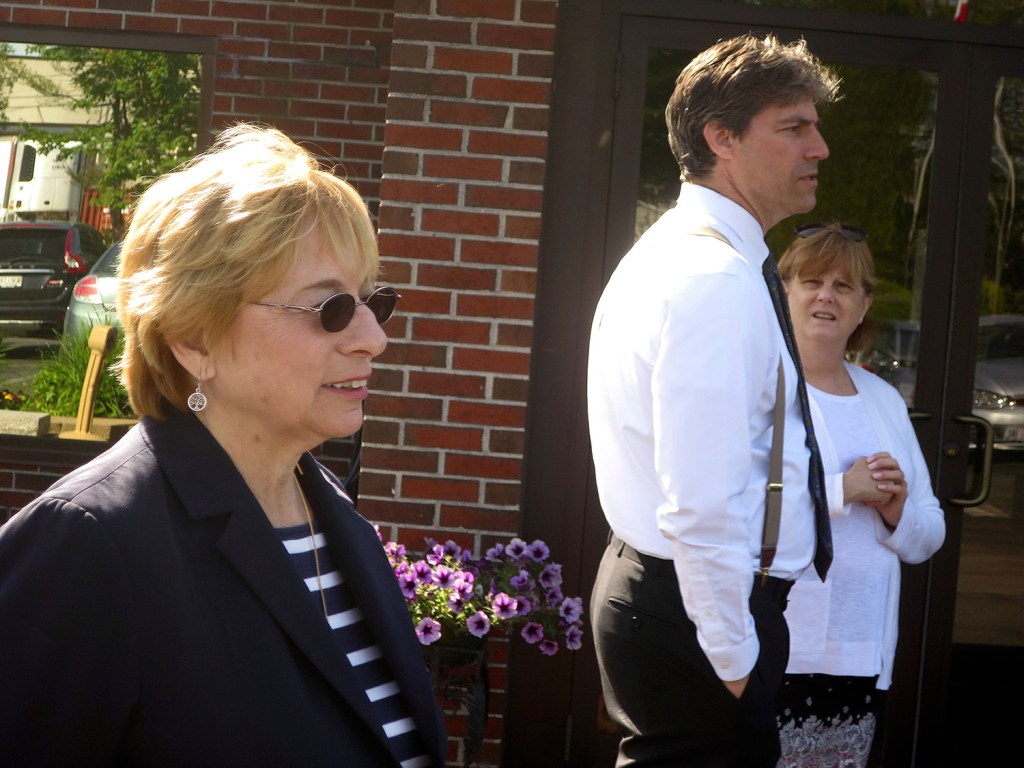
Maine Republican gubernatorial primary candidate Shawn Moody is congratulated by supporters in Gorham. Troy R. Bennett/The Bangor Daily News via AP
Shawn Moody won Maine Republicans’ primary for governor Tuesday, while Attorney General Janet Mills held a modest lead over Sanford attorney Adam Cote on the Democratic side.
With 63 percent of precincts reporting shortly before 1 a.m. Wednesday, Moody had 55 percent of the vote and was carrying Maine’s largest cities, including Bangor, Lewiston and Portland. The Associated Press called the race for Moody shortly after 12:30 a.m.
At the same time in the Democratic race, Mills had 33 percent of the vote and Cote had 28 percent.
With Moody’s majority vote, ranked-choice voting won’t complicate matters for Republicans, but Democrats will have to wait several days for a retabulation of ballots to determine who will get the party’s nod.
Moody’s commanding lead compelled House Minority Leader Ken Fredette, R-Newport, one of his three competitors for the party’s nomination, to concede in a tweet that offered congratulations to Moody just after 10 p.m..
“I am proud of the campaign we ran, and I want to thank each and every person who supported me along the way,” Fredette tweeted. “I’m looking forward to returning to the Legislature next week to finish our work.”
Running a distant third in the Republican race, former Health and Human Services Commissioner Mary Mayhew stopped short of conceding but vowed to do whatever she could to ensure that a Republican is elected in November.
In remarks to supporters at his Gorham headquarters late Tuesday, Moody did not claim victory.
“It’s amazing how evenly spread our support has been,” he said. “We are going to go to work for the whole state. North, south, east and west, it’s about all of us, it’s about Mainers and we are going to take our state back.”
The Republican candidates were Fredette, Senate Majority Leader Garrett Mason of Lisbon, Mayhew of South China, and Moody. Mason handily carried his hometown, winning 72 percent of the vote there, but nearby Lewiston and Auburn went for Moody. Moody also won more votes than either Mayhew or Fredette in their hometowns of China and Newport, respectively.
All four Republicans tried to align their positions with outgoing Gov. Paul LePage and show how they intend to carry on LePage’s agenda of cutting taxes, shrinking government and reforming welfare.
Moody secured the endorsement of LePage’s wife, Ann LePage, and hired former LePage staffers, including the governor’s daughter, Lauren LePage, and longtime political adviser Brent Littlefield. Mayhew has touted her work on welfare reform and balancing the state’s budget as a member of LePage’s cabinet.
Fredette has often led the charge at the State House to sustain LePage vetoes of bills that conservative Republicans disliked, including five different expansions of Medicaid. Mason has touted his voting record in the state Senate backing the LePage agenda, including opposition to bills that would stiffen gun-control laws in Maine.
DEMOCRATS PLEDGE DIFFERENT STYLE
The Democratic race for governor featured seven candidates – Cote, Donna Dion of Biddeford, Mark Dion of Portland, Mark Eves of North Berwick, Mills of Farmington, Diane Russell of Portland and Betsy Sweet of Hallowell – all pledging to bring a completely different governing style and priorities list to Augusta than LePage’s.
For weeks, many observers have placed Mills and Cote at the front of the crowded field despite limited public polling but with neither receiving enough support to win the race outright. And Tuesday’s elections followed that story line.
Mills held the lead for most of the night but, with roughly one-third of the votes, she will have to face Cote and the other Democratic contenders in the ranked-choice process.
As part of the tabulation, the candidate with the least votes – which was Donna Dion at midnight – would be eliminated and her supporters’ votes will be given to whoever they ranked No. 2 on their ballots. That process will continue with the other candidates at the bottom of the field until one person receives a majority.
Cote expressed optimism late Tuesday night.
“We are feeling very good,” Cote said. “We had heard from polls that we were 30 points behind but we didn’t believe that to be true,” Cote said. “We felt it was more in the five-point range and that it would be decided by ranked-choice voting. And that is exactly what is happening.”
Maine’s first-ever use of ranked-choice voting has been a factor throughout the Democratic campaign. The tone of the Democratic primary was largely congenial as candidates sought to at least become voters’ second or third choice if they weren’t the top selection. In recent weeks, Sweet has teamed with fellow progressive Eves – a former House Speaker – to urge voters to place the two at the top of their rankings in either order.
With 60 percent of precincts reporting, Sweet was polling at 16 percent and Eves at 14 percent. The question for the rest of the week will be whether that pact will be enough to move either up during the ranked-choice tabulation process and, if not, whether their supporters favored Cote or Mills.
Contact Scott Thistle at 791-6330 or:
sthistle@pressherald.com
Twitter: thisdog
Contact Kevin Miller at 791-6312 or:
kmiller@mainetoday.com
Twitter: KevinMillerPPH
Send questions/comments to the editors.






Comments are no longer available on this story